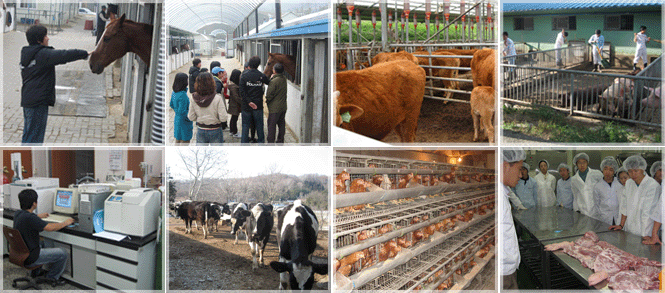About the Department of Animal Biotechnology
Goals
Under the School of Animal Resources and Biotechnology, there are two specialized majors; Animal Biotechnology and Animal Science.
Animal Biotechnology
The 21st Century is the age of life science. With global concerns surrounding food, each and every country in the world carries out projects to develop BT(biotechnology) extensively on a nationwide scale. Accordingly the Animal Biotechnology Major emphasizes the development of competitive and expert manpower for future leaders with basic principles and applied techniques and skills in high-tech laboratory on the basis of liberal arts and a great personality. In order to strengthen the employment competitiveness, we provide multi-educational systems fusing Animal Biotechnology with ET, NT and IT. And we focus on cultivating professionals and scholars to apply their learning to globalization and serve the welfare of human, community, and country.
Animal-related industries and its academic domains are more diversified and specialized due to the increase of productivity and the invention of new functioning materials as high technology and facility automation develops. Meeting the demands of the time, the Animal Biotechnology Major plays a leading role to develop animal resources and life science and furthermore educates competent professionals to improve the well-being and welfare of human.
What to learn
Animal Biotechnology Major is:
- Composed of fundamental studies of animal science and medical science, therefore students may choose either way.
- Teaching and doing researches on life science, animal related biotechnology, production of cloning and transforming, and development of hybridized organ production.
What to do after graduation
Curriculum
| Year | Course (Credit) | Year | Course (Credit) |
|---|---|---|---|
| 1-2-ME 1-2-ME 1-2-ME 1-2-ME |
Introduction to Biochemistry(3) Animal Experimental Statistics(3) Pet Animal Sciences(3) International Agriculture(3) |
||
| 2-1-M 2-1-ME 2-1-ME 2-1-ME 2-1-ME |
Animal PhysiologyⅠ(3) Animal Genetics (3) Animal Biochemistry (3) Microbiology (3) Animal Nutrition (3) |
2-2-M 2-2-ME 2-2-ME 2-2-ME 2-2-ME 2-2-ME |
Population Genetics (3) Forage Crop (3) Experimental Animal (3) Animal Immunology (3) Animal PhysiologyⅡ (3) Cellular Biology (3) |
| 3-1-M 3-1-M 3-1-ME 3-1-ME 3-1-ME |
Animal Breeding (3) Animal Feeding & Practice (3) Muscle Biology (3) Milk Science (3) |
3-2-M 3-2-M 3-2-ME 3-2-ME 3-2-ME |
Animal Reproduction (3) Animal Production & Practice (3) Muscle Food Processing & Practice (3) |
| 3-1-ME | Animal Farm Environment (3) Poultry Science (3) |
3-2-ME | Animal Embryology (3) Swine Science (3) Equine Science (3) |
| 4-1-ME 4-1-ME 4-1-ME 4-1-ME 4-1-ME |
Roughage Utilization (3) Animal Behavior (3) Animal Disease (3) Artificial Insemination (3) Beef Cattle Production (3) |
4-2-ME 4-2-ME 4-2-ME 4-2-ME |
BioEnergy (3) Feed Manufacturing Technology (3) Law & Regulations on Animal Industry (3) Seminar in Animal Science (3) |
* M: Major Course
* ME: Major Elective Course

